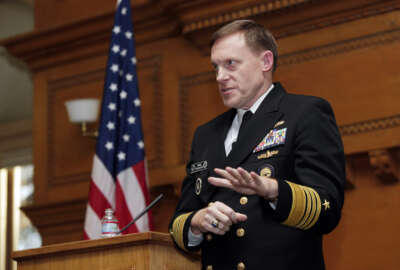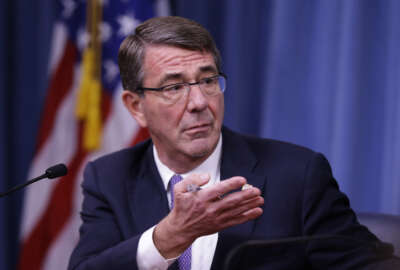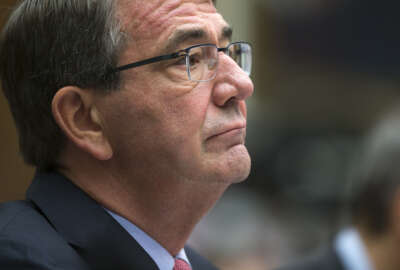
Memo gives behind the scenes look at DoD reforms
A memo obtained by Federal News Radio looks at what Pentagon leaders wanted and explicitly didn't want in reforming the Defense Department.
A Defense Department memo obtained by Federal News Radio sheds more light on the specifics of Defense Secretary Ash Carter’s proposed reforms.
The memo, addressed to Carter from Deputy Chief Management Officer Peter Levine and Lt. Gen. Thomas Waldhauser of the Joint Chiefs of Staff J7, recommends specific actions DoD should take in revising the Goldwater-Nichols Act.
The memo also explicitly outlines actions DoD should avoid in reforming the department.
The recommendations were made by a series of working groups and vetted by senior leaders in the department.
A few of the recommendations were not mentioned by Carter during his reform roll out at the Center for Strategic and International Studies (CSIS) earlier this week.
Those include a suggestion to evaluate the feasibility of conducting joint reviews of major acquisition programs between the military services and the Office of the Secretary of Defense.
The memo also notes DoD should use big data to find efficiencies for acquisition programs and to better address acquisition requirements.
Another recommendation tells Carter to consider developing capabilities-based assessments with component-led study advisory groups that have external stakeholders. That would “bolster upfront analytic rigor to decisions impacting materiel solutions,” the memo states.
Capabilities-based assessments identify criteria required to successfully execute missions, the shortfalls in existing systems and other options for achieving the goals.
The writers of the memo suggest elevating U.S. Cyber Command to a full combatant command, which DoD has been considering the past few years.
Carter hinted at doing this during his CSIS speech, but did not come out directly and say it. CYBERCOM commander and National Security Agency Director Adm. Mike Rogers fully advocated the elevation during a April 5 Senate Armed Services hearing.
“When we think about what should elevate something to the level of a combatant command, the questions are whether this function rises to a global level, and whether it’s of sufficient priority to merit coordination across the entire department,” Rogers said. “The other issue we’d be addressing is one of speed. A combatant commander designation would allow us to be faster, which would generate better mission outcomes. I would also argue that the department’s processes of budget prioritization, strategy and policy are all generally structured to enable direct combatant commander input into those processes. That’s what they’re optimized for. I believe that cyber needs to be a part of that direct process.”
The memo states CYBERCOM and the NSA should retain their relationship. Any separation between the two should be conditions based on and take into account the separation of personnel and platforms as well as the institutional mechanisms that ensure NSA can respond to the combatant commands.
The dual-hatted nature of CYBERCOM and the NSA was something that worried Sen. Angus King (I-Maine) during the hearing.
“I’m finding it harder and harder to justify you holding two jobs, given the complexity,” King told Rogers. “This arrangement was created in 2009, which in technological terms is a century ago. I understand the need for a relationship between NSA and Cyber Command. But particularly if we move in the direction of setting up Cyber Command as its own independent combatant command, to have the same person trying to run those two agencies — I just think that’s impractical and almost impossible.”
Roger’s recommended keeping the position dual-hatted for now.
Another recommendation asks DoD to consolidate 150 billets, saving $128 million over five years, to pay for the elevation of CYBERCOM.
In his CSIS speech, Carter stressed the importance of joint duty and modifying its requirements. The recommendations concur with that sentiment and go farther in removing a required 10-week course to achieve Joint Profession Military Education II. The memo states the course is no longer needed.
“The department seeks more flexible and tailorable delivery methods that will meet Phase II requirements in a manner consistent with [Joint Staff and combatant command] needs while maintaining academic rigor,” the memo states.
What may pique more interest is what the writers of the memo tell Carter not to do, as it sheds light on some of the ideas DoD was considering.
Some actions not recommended include merging the Defense Logistics Agency with U.S. Transportation Command. The memo states there is minimal overlap between the two and a merger would risk loss of focus on essential missions.
The writers of the memo advise against the establishment of a general staff, as it would quickly become a new bureaucracy that “is removed from the needs of our fighting forces and less responsive to those needs than the [Joint Staff].”
Copyright © 2025 Federal News Network. All rights reserved. This website is not intended for users located within the European Economic Area.
Scott Maucione is a defense reporter for Federal News Network and reports on human capital, workforce and the Defense Department at-large.
Follow @smaucioneWFED
Related Stories





